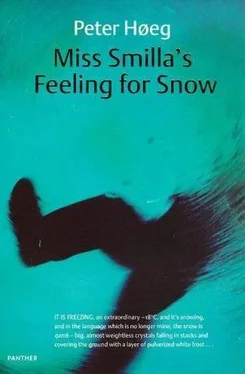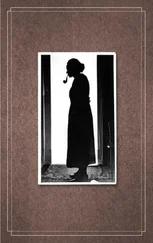Peter Høeg - Smilla's Sense of Snow aka Miss Smilla's Feeling for Snow
Здесь есть возможность читать онлайн «Peter Høeg - Smilla's Sense of Snow aka Miss Smilla's Feeling for Snow» весь текст электронной книги совершенно бесплатно (целиком полную версию без сокращений). В некоторых случаях можно слушать аудио, скачать через торрент в формате fb2 и присутствует краткое содержание. Жанр: Современная проза, на английском языке. Описание произведения, (предисловие) а так же отзывы посетителей доступны на портале библиотеки ЛибКат.
- Название:Smilla's Sense of Snow aka Miss Smilla's Feeling for Snow
- Автор:
- Жанр:
- Год:неизвестен
- ISBN:нет данных
- Рейтинг книги:3 / 5. Голосов: 1
-
Избранное:Добавить в избранное
- Отзывы:
-
Ваша оценка:
- 60
- 1
- 2
- 3
- 4
- 5
Smilla's Sense of Snow aka Miss Smilla's Feeling for Snow: краткое содержание, описание и аннотация
Предлагаем к чтению аннотацию, описание, краткое содержание или предисловие (зависит от того, что написал сам автор книги «Smilla's Sense of Snow aka Miss Smilla's Feeling for Snow»). Если вы не нашли необходимую информацию о книге — напишите в комментариях, мы постараемся отыскать её.
Smilla's Sense of Snow aka Miss Smilla's Feeling for Snow — читать онлайн бесплатно полную книгу (весь текст) целиком
Ниже представлен текст книги, разбитый по страницам. Система сохранения места последней прочитанной страницы, позволяет с удобством читать онлайн бесплатно книгу «Smilla's Sense of Snow aka Miss Smilla's Feeling for Snow», без необходимости каждый раз заново искать на чём Вы остановились. Поставьте закладку, и сможете в любой момент перейти на страницу, на которой закончили чтение.
Интервал:
Закладка:
I glance at the mechanic. Suddenly I can't understand why he's come with me. Maybe he doesn't know why, either. Maybe because of the lure, of the improbable. I point at the door to the metal shop.
"There's a mallet in there."
He doesn't seem to hear me. He seizes hold of the molding around the edge of the wall and pulls it off. He examines the nail holes. It's fresh wood.
He slips his hands in the gap between the paneling and the bulkhead and pulls. It won't budge. There are about fifteen nails in each side. Then he yanks at it sharply and the wall comes away in his hands. It's a piece of plywood half an inch thick and six yards square. In his hands it looks like a cupboard door.
Behind it is a refrigerator that's six feet tall and three feet wide, made of stainless steel. It reminds me of the dairy shops in Copenhagen in the sixties, where for the first time I saw people using energy to keep something cold. It has been secured against the rolling of the ship with metal fittings that must have been attached to the original wall of the room and then screwed onto the base of the refrigerator. It has a cylinder lock on the door.
He gets a screwdriver and unscrews the fittings. Then he takes hold of the refrigerator. It seems immovable. He braces himself. Then he tugs it into the room. There's something insightful about his movements, a knowledge that you should give it your all only for fractions of a second. He tugs three more times, and the refrigerator now has its back to us. He has a Phillips screwdriver on his knife. There, must be fifty screws all around the back covering. He inserts the screwdriver, supporting the screw with the forefinger of his left hand, turning counterclockwise smoothly, not in spurts. The screws seem to leave the holes of their own accord. It takes, less than ten minutes for him to remove all of them. He carefully stores them in his pocket. He lifts off the entire back covering with its cords, cooling grid, compressors, and fluid tank. Even under these circumstances, I note that what we're looking at is both banal and out of the ordinary: we're looking inside the back of a refrigerator.
It's full of rice. The square boxes are carefully stacked up from top to bottom.
The mechanic takes out a box and opens it, lifting the boiler bag free of its container. I have time to think that I didn't have much to lose, after all. Then I notice the muscles in his face contract. I take another look at the bag. It's almost opaque. It's not rice. It's a vacuum pack around a substance that is dense and yellowish like white chocolate.
He opens a knife blade and slices open the bag. With a little sigh it takes in air. Then a lumpy dark powder pours into his hand; it has the consistency of melted butter mixed with the kind of sand used in an hourglass.
He chooses a few more boxes at random, opens them, looks inside, and then carefully returns them to their place.
He screws the back covering on and shoves the refrigerator back. I don't help him; I can't touch him anymore. He puts up the plywood and presses the wall into position. He gets a hammer and meticulously pounds it into place. His movements are absentminded and robotlike. Not until then do we look at each other.
"Mayam," I say. "A stage between raw opium and heroin. With a high oil content; that's why it has to be refrigerated. Tørk developed it. Ravn told me about it. It's part of the agreement between Tørk and Verlaine. It's Verlaine's piece of the pie. We're supposed to pull into some port on our way back. Maybe Holsteinsborg, maybe Nuuk. Maybe he has connections on the Greenland Star. Only ten years ago they were smuggling liquor and cigarettes up here. That's already a thing of the past. That's already the good old days. Now there's lots of cocaine in Nuuk. There's a Greenland upper class that lives like Europeans. There's a big market up here."
His eyes are dreamy, remote. I have to reach him. "Jakkelsen must have discovered it. He must have found out about it. And then he gave himself away. He must have been high and he overestimated his own abilities. He put pressure on them. That forced them to act. Tørk took care of the telegram for them: He had to do it. But he and Verlaine hate each other. They come from two different worlds. They only work together because they can use each other."
He leans down toward me and takes my hands. "Smilla," he whispers, "when I was a kid I had a windup tank with caterpillar treads. If you put it down in front of something, it would climb straight over it because it had such low gears. If the object was perpendicular the tank would turn around and crawl along the edge until it found some other way over. You couldn't stop it. You're like that tank, Smilla. You were supposed to be kept out of all this, but you kept on getting involved. You were supposed to be left behind in Copenhagen, but suddenly you wound up on board. They lock you up-that was my idea, it was the safest thing for you. They lock the door; that's the end of Smilla. And then suddenly you're out again. You keep popping up. You're like that tank, Smilla."
Irreconcilable emotions are battling in his voice. "When I was a kid," I say, "my father gave me a teddy bear. Until then we'd only had dolls that we'd made ourselves. The bear lasted a week. First it got dirty, then the fur fell out. It got holes in it and the stuffing came out; otherwise it was hollow inside. You're like that teddy bear, Føjl."
We're sitting next to each other on the bunk in his cabin. On the desk is one of those flat flasks, but he's the only one drinking.
He's huddled up with his hands between his thighs. "It's a meteorite," he says. "Some sort of stone. Tørk says that it's ancient. It's wedged into a kind of saddle in the cliff beneath the ice. We're going to pick it up."
I think about the photographs among Tørk's papers. I should have guessed then. The ones that looked like X-rays. The Widmannstatten structure. It's in every textbook. The manifestation of the relationship between nickel and iron in meteorites.
"Why this one?" I ask.
"Whoever finds something of interest in Greenland has to report it to the National Museum in Nuuk. From there they'll c-call the Mineralogical Museum and the Institute for Metallurgy in Copenhagen. The find will be registered as something of national interest and will be confiscated."
He leans forward.
"Tørk says it weighs fifty tons. It's the biggest meteorite ever found. They took along oxygen and acetylene in '91. They cut off several fragments. Tørk says there are diamonds in it. Substances not found on earth."
If it hadn't been for the perverse situation, I might have almost thought there was something touching and boyish about him. A child's enthusiasm at the thought of the mysterious substances, the diamonds, the gold at the end of the rainbow.
"What about Isaiah?"
"He went along in '91. He was with his f-father." Of course that's the way it happened.
"He ran away from the ship in Nuuk. They had to leave him behind. Loyen found him and sent him home."
"And you, Føjl? What did you want with him?" When he understands what I'm asking, his expression becomes stony and hard. Now, when it's all too late, anyway, I manage to reach into the far corners of his soul.
"I never touched him, of course. Up there on the roof. I loved him, in a way I've n-never…"
His stuttering strangles his sentence. He waits for the tension to subside.
"Tørk knew that Isaiah had taken something. A c-cassette tape. The glacier had moved. They searched for two weeks without finding it. Finally Tørk chartered a helicopter and flew to Thule. To find the Inuits who had been on the expedition in '66. He found them, all right. But they d-didn't want to come back. So he got a description of the route from them. That's the tape the Baron took. That's what you found."
Читать дальшеИнтервал:
Закладка:
Похожие книги на «Smilla's Sense of Snow aka Miss Smilla's Feeling for Snow»
Представляем Вашему вниманию похожие книги на «Smilla's Sense of Snow aka Miss Smilla's Feeling for Snow» списком для выбора. Мы отобрали схожую по названию и смыслу литературу в надежде предоставить читателям больше вариантов отыскать новые, интересные, ещё непрочитанные произведения.
Обсуждение, отзывы о книге «Smilla's Sense of Snow aka Miss Smilla's Feeling for Snow» и просто собственные мнения читателей. Оставьте ваши комментарии, напишите, что Вы думаете о произведении, его смысле или главных героях. Укажите что конкретно понравилось, а что нет, и почему Вы так считаете.




![Рута Шепетис - Ashes in the Snow [aka Between Shades of Gray]](/books/414915/ruta-shepetis-ashes-in-the-snow-aka-between-shades-thumb.webp)







